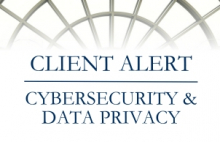Taxpayers May Continue to Deduct 50% of the Cost of Business Meals
October 2018In Notice 2018-76, the Internal Revenue Service (IRS) provided interim guidance that taxpayers may continue to deduct 50% of the cost of business meals. It also states that the IRS intends to publish proposed regulations under Section 274 of the Internal Revenue Code (the “Code”) to clarify when business meal expenses are nondeductible entertainment expenses and when they are 50% deductible expenses. Until the proposed regulations are effective, taxpayers may rely on the guidance in Notice 2018-76 for the treatment of expenses for certain business meals.
Background
The federal Tax Cuts and Jobs Act (TCJA) modified Section 274 of the Code to eliminate deductions for business entertainment expenses, even though such expenses, including the cost of meals during the entertainment, had generally been only 50% deductible. Further, such meals and entertainment expenses were deductible only to the extent they were (1) ordinary and necessary in carrying on the taxpayer’s business, and (2) either (i) “directly related” to or (ii) “associated with” the active conduct of the taxpayer’s business. To satisfy the “directly related” test, taxpayers had to show that (1) the main purpose of the entertainment was to conduct business, (2) business was in fact conducted during the entertainment period, and (3) there was more than a general expectation of receiving income or another business benefit from the entertainment. Alternatively, entertainment expenses, including the cost of meals, were deductible if the entertainment was associated with the business and if the entertainment took place directly before or after a substantial business discussion. The TCJA eliminated both the “directly related” and the “associated with” tests for deducting meals and entertainment expenses, thus making entertainment expenses no longer deductible.
Interim Guidance
Section 274, as amended by the TCJA, generally disallows any deduction with respect to an activity that is of a type generally considered to constitute entertainment, amusement, or recreation. No deduction is allowed for the cost of any food or beverages unless (1) the expense is not lavish or extravagant under the circumstances, and (2) the taxpayer (or employee of the taxpayer) is present. Further, the deduction for food and beverage expenses is also generally limited to 50% of the expenses.
The TCJA did not address the circumstances in which the provision of food and beverages might constitute non-deductible entertainment expenses. Under Notice 2018-76, taxpayers may deduct 50% of an otherwise allowable business meal expense if:
- The expense is ordinary and necessary in carrying on the taxpayer’s business;
- The expense is not lavish or extravagant under the circumstances;
- The taxpayer, or an employee of the taxpayer, is present at the meal;
- The food and beverages are provided to a current or potential business customer, client, consultant, or similar business contact; and
- In the case of food and beverages provided during or at an entertainment activity, the food and beverages are purchased separately from the entertainment, or the cost of the food and beverages is stated separately from the cost of the entertainment on one or more bills, invoices, or receipts. The entertainment disallowance rule may not be circumvented through inflating the amount charged for food or beverages.
The examples in Notice 2018-76 illustrating these requirements involve a taxpayer taking a client to a baseball game. Although the cost of the baseball tickets is a nondeductible entertainment expense, the cost of hot dogs and beverages at the game, which are purchased separately from the game tickets, is not an entertainment expense and thus is 50% deductible. In the case of a suite at a sporting event, if the cost of the food and drinks is separately stated from the cost of the game tickets, the cost of the food and drinks is 50% deductible. In contrast, if the food and drinks are not purchased separately from the game tickets and their cost is not separately stated on the invoice, then none of the expenses associated with the game is deductible.
The IRS has generally required that expenses involving meals and entertainment be accompanied by documentation that provides (1) the amount of the expense, (2) the time and place of the expense, (3) the business purpose of the expense, and (4) the business relationship to the taxpayer of the other individuals receiving the benefit. Although these substantiation requirements are not discussed in Notice 2018-76, we recommend that businesses continue to maintain appropriate records to substantiate any business meal expenses. This may create an issue for 2018 as employers may not have maintained records breaking out food and drink expenses from entertainment expenses. Businesses should review their records and ensure deductible expenses for food and drinks are separately stated or billed from any entertainment expenses incurred with the business meals.
If you have any questions regarding deductions for business and entertainment expenses or the impact of Notice 2018-76, please contact Michael T. Donovan or Ryan C. Furtick.








